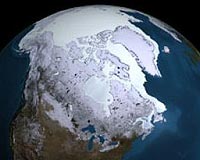| . |  |
. |
Ottawa (UPI) Aug 18, 2009 It has all the trappings of the Cold War except a vituperative war of words, or dark hints of Armageddon. Canada's show of military might north of its icy shores is a flag-waving exercise to assert not only Canadian sovereignty but also NATO's rights over the arctic territory. The audience? Russian military in their full paraphernalia of hardware, also engaged in more or less similar pursuits. Of all the nations currently ensconced in the arctic, Russia is the only power outside NATO or Western alliances. It is the only arctic neighbor Canada has had angry exchanges with in recent months. At a NATO meeting in Iceland in January, former NATO chief Jaap de Hoop Scheffer warned, "The High North is going to require even more of the Alliance's attention in the coming years. As the ice-cap decreases, the possibility increases of extracting the High North's mineral wealth and energy deposits." He said NATO already had agreed on "a number of guiding principles for NATO's role in energy security" for Europe and the Western Hemisphere at large. "The Arctic has become one of Canada's top priorities" since it defined a new Northern Strategy of stepped-up involvement in the north, says ISRIA.com political consultancy. And according to Global Research, Montreal, Canadian actions represent not only Canada's own concerns but also American and NATO aims in the arctic. The buildup of tensions is not a quirky development. As the arctic north's apparently vast resources come under increasing scrutiny, lines are being drawn between the competing nations, in particular between Russia and all the others. Eight nations have interests in the arctic region -- Canada, Denmark through its control over Greenland, Finland, Iceland, Norway, the Russian Federation, Sweden and the United States. "Global warming combined with the increasing demand for shorter trade routes, fossil fuels, and minerals made the Arctic an interest of strategic significance, not only for Canada but for all the countries in the area," said an ISRIA report. This year's Canadian military maneuvers, Operation Nanook 09, which end Aug. 28, were termed "a military exercise to confirm sovereignty over its Arctic territory." Canadian defense authorities said Nanook 09, one of three exercises this year, "will see the Canadian Forces demonstrate a visible presence in the eastern Arctic with sea, land and air forces operating in the Baffin Island region." It said the exercise would include "sovereignty patrolling, a military exercise, and a whole-of-government exercise." Officials said that would involve more troop deployments and expansion of Canadian presence with on-site training and patrols. Canada wants to demonstrate it is fully capable of controlling its northern territory and warding off Russian advances. Senior Canadian government leaders exchanged heated words with Russian counterparts after accusing Russia of bullying and airspace violations. Canadian officials warned Moscow they would counter any Russian incursions with superior -- albeit American -- air power. Everything that happens in the arctic can potentially impact Canada's national security, say analysts. The arctic represents 40 percent of Canada's landmass, and more than 19,000 islands in the Arctic Archipelago hold about 108,000 Canadian citizens. Critics of Prime Minister Stephen Harper have urged restraint on ministers engaged in inflammatory attacks on Russia, lest things get out of hand, Cold War-style. Share This Article With Planet Earth
Related Links Beyond the Ice Age
 Arctic Images Derived From Classified Data Should Be Made Public
Arctic Images Derived From Classified Data Should Be Made PublicWashington DC (SPX) Jul 17, 2009 Hundreds of images derived from classified data that could be used to better understand rapid loss and transformation of Arctic sea ice should be immediately released and disseminated to the scientific research community, says a new report from the National Research Council. The committee that wrote the report emphasized that these Arctic images show detailed melting and freezing processes ... read more |
|
| The content herein, unless otherwise known to be public domain, are Copyright 1995-2009 - SpaceDaily. AFP and UPI Wire Stories are copyright Agence France-Presse and United Press International. ESA Portal Reports are copyright European Space Agency. All NASA sourced material is public domain. Additional copyrights may apply in whole or part to other bona fide parties. Advertising does not imply endorsement,agreement or approval of any opinions, statements or information provided by SpaceDaily on any Web page published or hosted by SpaceDaily. Privacy Statement |